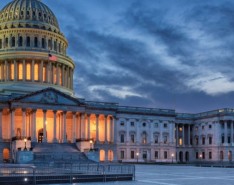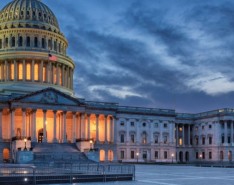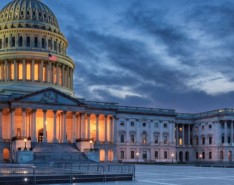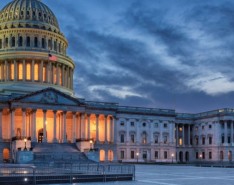WASHINGTON, D.C. (September 21, 2021)—The National Association for Home Care & Hospice (NAHC) has joined a group of like-minded organizations to tell Congress to support existing bipartisan, bicameral legislation that would ensure Medicare beneficiaries have access to intravenous (IV) medications in the comfort of their own homes.
legislation
WASHINGTON, D.C. (August 13, 2021)—On a party line vote, the U.S. House of Representatives advanced the annual appropriations for the Department of Health and Human Services (HHS) for fiscal year 2022, approving $119 billion in discretionary spending, an increase of $23 billion over the previous year.
(Discretionary spending does not include Medicare and Medicaid care-related expenses, as that is considered mandatory spending and not subject to the annual appropriations process.)
WASHINGTON, D.C. (August 3, 2021)—Late on July 29, U.S. Sens. Jacky Rosen (D-Nevada) John Barrasso (R-Wyoming), Tammy Baldwin (D-Wisconsin) and Deb Fischer (R-Nebraska)—co-chairs and co-founders of the Senate Comprehensive Care Caucus—announced the introduction of the bipartisan Expanding Access to Palliative Care Act (S. 2565). Sens. Rosen, Barrasso and Baldwin also announced the introduction of their bipartisan Improving Access to Transfusion Care for Hospice Patients Act of 2021 (S.
WASHINGTON, D.C. (July 29, 2021)—The National Association for Home Care & Hospice (NAHC) and Partnership for Quality Home Healthcare (PQHH) today commended the introduction of the Choose Home Care Act of 2021. The bipartisan legislation, introduced by Sens.
WASHINGTON, D.C (July 16, 2021)—The National Association for Home Care & Hospice (NAHC) and a group of like-minded organizations representing America's health providers have written a letter to Senate Majority Leader Charles Schumer (D-NY) and Senate Minority Leader Mitch McConnell (R-KY), asking them to:
• oppose an extension of mandatory Medicare sequestration as a pay-for in any infrastructure package; and
RALEIGH, N.C. (July 8, 2021)—North Carolina home medical equipment (HME) suppliers closed a loophole that could have weakened Medicaid managed care organization (MCO) rate floor policy and in addition were able to secure an extra two years of protections through recent action in the North Carolina Legislature.
WASHINGTON, D.C. (May 25, 2021)—Recently, legislation has been introduced in both the Senate and House of Representatives that would make various improvements to the provision of telehealth. The Creating Opportunities Now for Necessary and Effective Care Technologies (CONNECT) for Health Act of 2021 (S. 1512/H.R. 2903) is being led by Sens.
WASHINGTON, D.C. (May 19, 2021)—At a recent recruiting event at a local high school, the health care providers present received “zero interest” from students, said Kara Allread, senior vice president and chief administrative officer of Greenville, Ohio-based Brethren Retirement Community and Brethren HomeCare. “They know we can’t compete” with retail and other industries, she said.
WASHINGTON, D.C. (March 26, 2021)—The Senate has passed by 90-2 vote a long-awaited bill that, among other health care provisions, would eliminate the 2% across-the-board cut to all Medicare payments, known as sequestration, until the end of 2021. To pay for the change, the bill would increase the fiscal year 2030 sequester cuts.
WASHINGTON, D.C. (March 25, 2021)—As previously reported, the Centers for Medicare & Medicaid Services (CMS) has published a new DMEPOS fee schedule for oxygen that reflects a long-sought fix for outdated budget neutrality provisions that was finally secured in December 2020 COVID-19 relief legislation. The updated rates, which go into effect on Apr.
WASHINGTON, D.C. (January 19, 2021)—As anticipated, the Medicare Payment Advisory Commission (MedPAC), an advisory body to Congress, met last week to finalize payment and policy recommendations that will be incorporated in its annual March Report to Congress.
WASHINGTON, D.C. (December 21, 2020)—A broad COVID-19 relief legislative package finalized by House and Senate leaders includes provisions to address a Medicare payment disparity for oxygen products in rural areas stemming from the application of outdated budget neutrality provisions in the 1997 Balanced Budget Act.
WASHINGTON, D.C. (December 17, 2020)—The National Association for Home Care & Hospice (NAHC) is expressing support for two measures that would improve reimbursement and respite care services.
WASHINGTON, D.C. (December 11, 2020)—As part of the year-end legislative push, the U.S. House of Representatives approved the Beneficiary Enrollment Notification and Eligibility Simplification Act of 2019 (BENES Act) to address negative findings by the Department of Health and Human Services’ Office of the Inspector General (OIG) regarding survey performance by Medicare-certified hospice providers.
WASHINGTON, D.C. (December 4, 2020)—Reps. Brad Schneider (D-Illinois) and David McKinley (R-West Virginia ) have introduced legislation to prevent Medicare reimbursement cuts to health care providers through the duration of the COVID-19 public health emergency. The Medicare Sequester COVID Moratorium Act (H.R. 8840) would continue a pause of 2% Medicare sequester cuts through the duration of the public health emergency. In March, Congress halted the 2% sequester cuts through Dec.
BIRMINGHAM, Ala. (October 19, 2020)—The COVID-19 pandemic changed the world for homecare—but also elevated the profession in the eyes of the public and lawmakers, William A. Dombi, president of the National Association for Home Care & Hospice, said Monday as he opened the group’s annual conference.
“What has emerged is energy and enthusiasm about our future,” Dombi said.
WASHINGTON, D.C. (September 8, 2020)—Reps. Cathy McMorris Rodgers (R-Wash.) and Dave Loebsack (D-Iowa) introduced H.R. 8158, new legislation to address unsustainable reimbursement rates for stationary oxygen products—including oxygen concentrators—furnished in rural areas.
California lawmakers are barreling toward an end-of-month deadline to pass or kill bills amid the biggest public health crisis the state has faced in a century.




